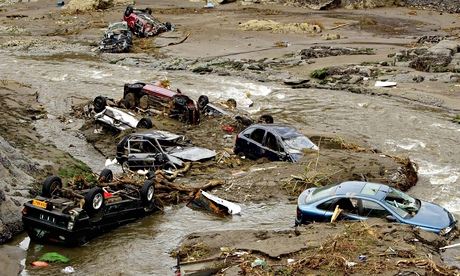
Flood damage in Boscastle, Cornwall, in 2004. Photograph: Graeme Robertson/Getty Images
Flash flooding in summer is likely to become much more frequent across the UK as a result of climate change, with potentially devastating results in vulnerable areas, according to new research.
The study, published in the peer-review journal Nature Climate Change, is the first to draw a direct link between climate change and an increase in summer downpours.
The research, a result of a collaboration between the Met Office and Newcastle University, used climate change computer models and standard weather prediction models of the type used for short-term weather forecasts. It found that summers would be drier overall, but punctuated by more extreme downpours.
These can have a much worse effect than the steady rainfall typical of winter, because the dry land is less capable of absorbing water, and when too much falls in a short period it runs off, causing flash floods of the type that struck Boscastle in 2004, one of the worst examples of sudden localised flooding in recent years.
Whether any given area is subject to flash flooding will depend heavily on its topography, such as the proximity of uplands and rivers, but vulnerable areas are likely to experience far more incidents than they did in the past.
It is not possible to say exactly how many more floods are likely, but the researchers said instances of particularly heavy summer rainfall – defined as more than 28mm in an hour – would be about five times more probable.
Elizabeth Kendon of the Met Office, the lead author of the study, said that the research was groundbreaking in using a high-resolution weather forecasting model to translate the likely effects of climate change into a detailed prediction of future UK summer weather.
"Until now, we haven't been able to do it in this way," she said. "This should help people to understand what is likely to happen in the summer in future. It's very important that we've detected this signal for heavier downpours in the UK. It's now for policymakers to decide what to do about it."
Some of the worst results could still be a few decades away, but the effects are already being felt and are likely to grow more severe, according to the models. But Kendon said more accurate predictions would depend on more scientific research being undertaken.
Summer rainfall is different to that typical of winter, when long-lasting steady bouts of heavy rain are common. These can cause their own flooding problems, as seen early this year when heavy rain caused widespread devastation in the UK with thousands of people forced to flee their homes.
Climate models suggest heavier winter rainfall for the UK. Summer downpours, such as those seen in 2012 when heavy rainfall followed a long period of drought, with disastrous results, are harder to predict but can take a greater toll as they are more sudden, and crops are ruined and tourism disrupted.
Kendon said: "It's the hourly rainfall rates that you look at in summer." The rain tends to fall in shorter but more intense bursts, caused by convective storms, but this has been difficult for climate models to simulate, because they lack the ability to home in on such brief events. It took the Met Office supercomputer, one of the most powerful in the world, nine months to run the necessary simulations.
No comments:
Post a Comment
thank you for your precious time and feedback.